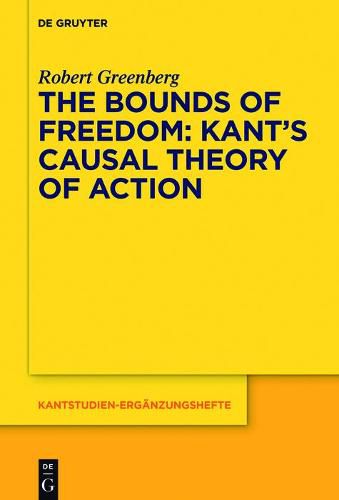Readings Newsletter
Become a Readings Member to make your shopping experience even easier.
Sign in or sign up for free!
You’re not far away from qualifying for FREE standard shipping within Australia
You’ve qualified for FREE standard shipping within Australia
The cart is loading…






This title is printed to order. This book may have been self-published. If so, we cannot guarantee the quality of the content. In the main most books will have gone through the editing process however some may not. We therefore suggest that you be aware of this before ordering this book. If in doubt check either the author or publisher’s details as we are unable to accept any returns unless they are faulty. Please contact us if you have any questions.
This monograph is a new interpretation of Kant’s atemporal conception of the causality of the freedom of the will. The interpretation is based on an analysis of Kant’s primary conception of an action, viz., as a causal consequence of the will. The analysis in turn is based on H. P. Grice’s causal theory of perception and on P. F. Strawson’s modification of the theory.
The monograph rejects the customary assumption that Kant’s maxim of an action is a causal determination of the action. It assumes instead that the maxim is definitive of the action, and since its main thesis is that an action for Kant is to be primarily understood as an effect of the will, it concludes that the maxim of an action can only be its logical determination.
Kant’s atemporal conception of the causality of free will is confronted not only by contemporary philosophical conceptions of causality, but by Kant’s own complementary theory of causality, in the Second Analogy of Experience. According to this latter conception, causality is a natural relation among physical and psychological objects, and is therefore a temporal relation among them. Faced with this conflict, Kant scholars like Allen W. Wood either reject Kant’s atemporal conception of causality or like Henry E. Allison accept it, but only in an anodyne form. Both camps, however, make the aforementioned assumption that Kant’s maxim of an action is a causal determination of the action. The monograph, rejecting the assumption, belongs to neither camp.
$9.00 standard shipping within Australia
FREE standard shipping within Australia for orders over $100.00
Express & International shipping calculated at checkout
This title is printed to order. This book may have been self-published. If so, we cannot guarantee the quality of the content. In the main most books will have gone through the editing process however some may not. We therefore suggest that you be aware of this before ordering this book. If in doubt check either the author or publisher’s details as we are unable to accept any returns unless they are faulty. Please contact us if you have any questions.
This monograph is a new interpretation of Kant’s atemporal conception of the causality of the freedom of the will. The interpretation is based on an analysis of Kant’s primary conception of an action, viz., as a causal consequence of the will. The analysis in turn is based on H. P. Grice’s causal theory of perception and on P. F. Strawson’s modification of the theory.
The monograph rejects the customary assumption that Kant’s maxim of an action is a causal determination of the action. It assumes instead that the maxim is definitive of the action, and since its main thesis is that an action for Kant is to be primarily understood as an effect of the will, it concludes that the maxim of an action can only be its logical determination.
Kant’s atemporal conception of the causality of free will is confronted not only by contemporary philosophical conceptions of causality, but by Kant’s own complementary theory of causality, in the Second Analogy of Experience. According to this latter conception, causality is a natural relation among physical and psychological objects, and is therefore a temporal relation among them. Faced with this conflict, Kant scholars like Allen W. Wood either reject Kant’s atemporal conception of causality or like Henry E. Allison accept it, but only in an anodyne form. Both camps, however, make the aforementioned assumption that Kant’s maxim of an action is a causal determination of the action. The monograph, rejecting the assumption, belongs to neither camp.